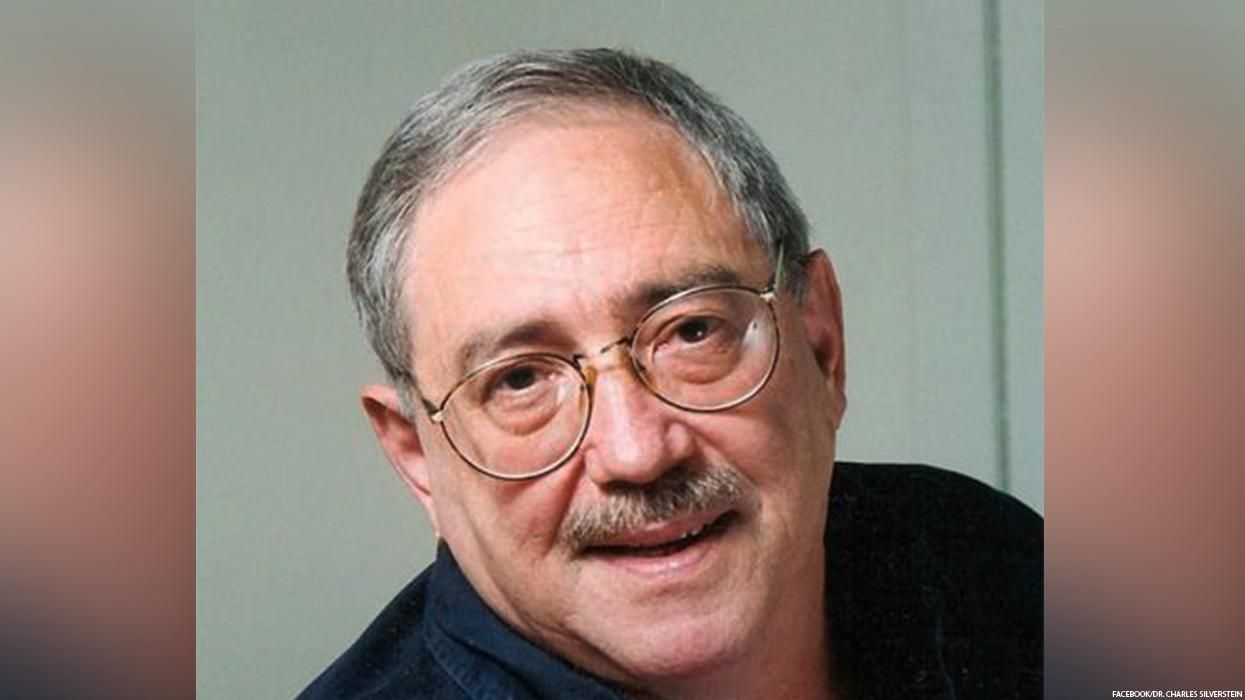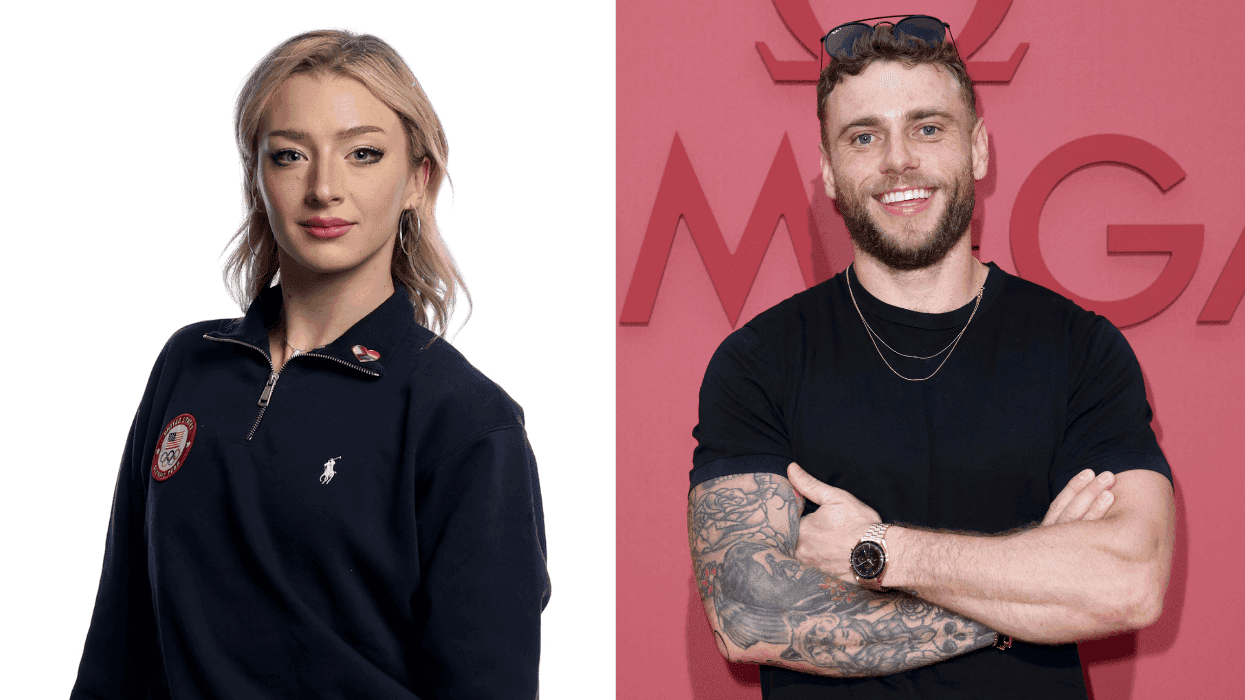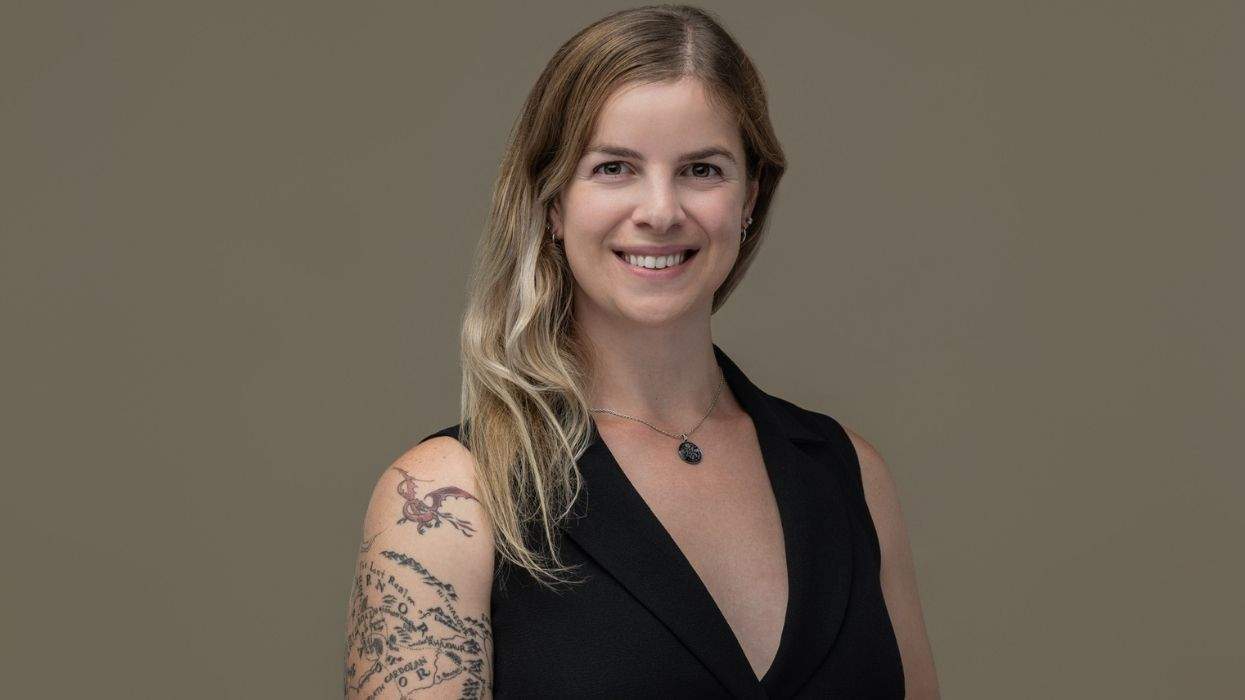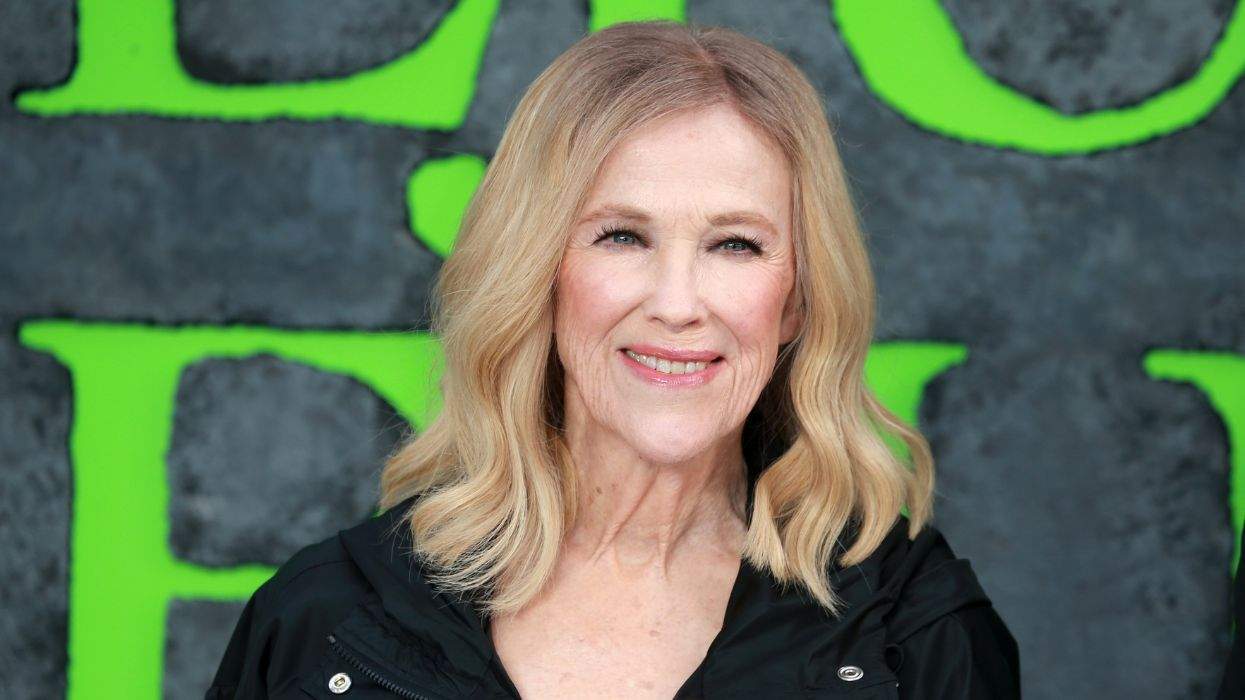Dr. Charles Silverstein died this week at the age of 87.
Best known for making the presentation before the American Psychiatric Association in 1973 that led to the removal of homosexuality from the Diagnostic and Statistical Manual’s list of mental illnesses, Silverstein was also a co-author of the landmark book The Joy of Gay Sex.
More than simply a sex manual with graphic drawings — though there was plenty of that — The Joy of Gay Sex, first published in 1977, was a first-of-its-kind guidebook for every aspect of the gay experience.
"The first time I had sex with a guy was a big learning experience. I didn't know what the hell I was doing. Fortunately, he did,” Dr. Silverstein recalled when I spoke to him in 2021. That night would prove to be a catalyst for him. In his 2011 memoir, For the Ferryman, he writes that it was in that moment that he decided to dedicate his life to fighting for the acceptance of gay people. He wanted future generations of gay men to be spared the pain and struggles that he faced.
The full text of my conversation with Dr. Charles Silverstein (originally recorded for the LGBTQ&A podcast) is below. It was one of his last interviews. He talks about his work with the Gay Activists Alliance, the earliest Pride marches where the gay community would greet each other by saying “Happy Birthday,” and the lasting legacy of The Joy of Gay Sex.
Jeffrey Masters: I want to talk about your role in helping to declassify homosexuality as a mental disorder. But first, can you talk about why it was originally classified as that? What was the evidence that seemed to back that up?
Charles Silverstein: Well, everything about sexuality is based upon the moral beliefs of a society and since homosexuality had been condemned as immoral, it just automatically was assumed that it should go into the Diagnostic and Statistical Manual as a mental disorder. Everything that wasn't basically a heterosexual, missionary position, motivated by reproduction was considered abnormal. And homosexuality, since invariably, you waste your seed, was considered ipso facto a disorder.
JM: When you were getting your Ph.D. and being taught this, did you initially believe that?
CS: I was very confused then. When I was getting my Ph.D., I was in the closet because I certainly was not going to let anyone in the program know that I was gay, because that would get me thrown out. There was a period before I got to college where I wanted to change, and I went into therapy for the purpose of changing. Obviously, it didn't work, and it never works, but it was what most people did in those days.
JM: We now refer to that as “conversion therapy,” but back then it was just considered “therapy,” right? The only purpose was to “cure” you.
CS: Yes, to change you into someone who was quote, "normal," meaning heterosexual, and that was my goal. All I accomplished was I had the opportunity of going to bed with some nice women who thought I was an appropriate match, but I wasn't.
JM: And eventually, you did make this presentation before the American Psychiatric Association. Was there a big debate over who would be the one to make the presentation?
CS: Since I was a psychologist, or at least working on my Ph.D. in psychology, it was decided that I should make the professional presentation, meaning the presentation, all the research and clinical work that suggested that homosexuality was not a mental disorder. And then Jean O'Leary, who had been a nun but was no longer a nun, she left the church. She would make the presentation from the point of view of ordinary people, about discrimination in the city of New York. So it was a very well-organized presentation. We knew what everybody was going to do.
JM: And this was identified as a goal of the movement. You weren’t simply working on your own.
CS: It had been started years before. Frank Kameny gets some of the credit for that. There are a number of psychiatrists who also were pushing to have homosexuality eliminated. Like every social movement, you always stand on the shoulders of the people who came before. Frank Kameny was not a part of this. Frank was a difficult person to get along with. Everyone who knew him would tell you that. He was a fierce fighter, but he could not have worked with us, and we wouldn't have had him helping us.
JM: Thinking about people like Frank Kameny, Jim Obergefell, Aimee Stephens: We often connect historic events with people. Was your name connected to this? Did you feel like a celebrity in the gay community?
CS: In some places, my name is connected with it, but I really do like to say these changes that occurred, are not because of any one person at any one time, but it's really the sum total of a number of people who fought, sometimes against the enemy, sometimes with each other, because we had lots of that. There is no one person that can claim responsibility for these changes. We worked together. I was chosen to make this presentation because I knew the research, I knew the data, and I could present it well.
JM: During all this time, you were a member of the Gay Activists Alliance, an early gay organization.
CS: They were a radical organization. Let me contrast it with Frank Kameny. When Frank had demonstrations, everybody had to be a good boy and good girl. There was a dress code, men had to wear suits, women dresses, shoes had to be shined. The GAA was quite the different. We weren't good boys, we were bad boys, and we wanted to be bad boys, and therefore, we were out there not dressed nicely, but dressed in ordinary clothes to make as much trouble as possible. What Frank and his group wanted to do was knock on the door of society and say, "Let us in. Oh, please, let us in." What the radical movement in the early '70s did was, not to say that we want to knock on the door, we wanted to fucking break it down, and march through and tell society, "We're changing you. You're going to change, and you better live with it." It was much more aggressive, but not violent. Aggressive, but not violent. And so, what we did, we had these, what were called zaps, and a zap was a demonstration where we would go to an organization and we'd break it up, and we found that professional organizations are the biggest sissies around, and they called us sissies, but they were the real sissies. They didn't know how to deal with us. They would be having a meeting and some of our members would get up and say, "We're taking over," and they would step to the side, because they didn't know what to do, and that's why we kept winning everywhere we went.
JM: You wrote that the members of the GAA were the strangest group of people you'd ever met. Why is that?
CS: That was at The Firehouse. See, our center was The Firehouse on Wooster Street, because it was a place that we thought of as a place of liberation, that anyone could come in. You had to walk through the door, you didn't need a membership card, you didn't have to pay any dues. People who were oppressed could feel self-identified and walk in. Therefore, we had some lunatics that used to walk in through the door, and that's what I was talking... We had some very strange people that came in, and no one was ever thrown out.
JM: This was The Firehouse that was four floors in Soho, right?
CS: Yes, yes.
JM: Who owned that building or paid the rent?
CS: I don't know who owned the building. It was called The Firehouse, because it was a firehouse, a real honest-to-goodness firehouse that no longer held the engines. It's not like there was a lot of fancy furniture. I mean, the furniture were the rejects from the street. I don't know who laid out the money to get the place. It was then paid for through dues... Not dues, but through our Saturday night dances where people paid $2 to come to the dance and all the soda or beer that you want for the night, and it's through that that they paid the rent.
JM: Because the group was an activist organization, but it also had this social component.
CS: Yes. It had a big social component, and that was really very important. At the dances, there would be a thousand guys there dancing. Easily a thousand. The meetings, the general meetings were like bedlam, would have two or 300 people there, and it was mostly a young crowd, but there were older people who were watching us and appreciative that we were there, but since they were older, they had more secure jobs that they had to worry about.
JM: And there was a big emphasis on discretion.
CS: Right. One of the primary problems about being gay in those days was the sense of loneliness and isolation. You could go to the baths and have sex with a guy and not know his name. You could go off of Central Park here and go to the Bridle Path and give or get a blow job, or you could go downtown to the trucks and do the same thing, but there wasn't a sense of affiliation between people. What GAA did was allow gay men primarily, to get to know each other in a setting other than just sex. You got to know each other as people, you got to know each other's names. You might visit each other during the week. Now, it may seem strange today, but in those days, we didn't do that.
JM: I've never heard anybody articulate it like that before. Are you saying the idea of gay people being in community, the gay community, didn’t exist yet?
CS: It was like Boys in the Band, that group of, of self-hating gay men who were very jealous of each other, and who were very sad. With GAA, and there were similar organizations in other cities as well, you got to know people as people. You laughed together, you went on zaps together, cursing the police or the city council, or whoever you wanted to curse, and you had that sense of camaraderie.
One day, at the end of a dance, we had a demonstration. We walked from The Firehouse over to the building of a councilman who was holding up a civil rights bill, and a thousand guys walking up the street and over to his building to shout as loud as we can at 2 o'clock in the morning and wake everybody up. That was our goal. In fact, he wasn't in this apartment, and we knew he wasn't. It didn't make any difference. The point was to have this demonstration, have the police show up, have the reporters and cameramen show up, and make a big tzimmes out of it.
JM: In your book For the Ferryman, you wrote about the earliest Pride marches and said that you would walk up to people and greet them by saying, "Happy birthday! It was as if we'd all been reborn.” I had never heard that detail before.
CS: Oh yeah, we all did that. We did that every year. Not only that, but at The Firehouse at the Saturday night dances, there would be an officer at the door, and when the person would come in, the officer would be there to say, "Welcome," and shake his hand. But you see, things like that were very important. They were meant to fight the isolation we experienced in those days. I mean, for instance, when I walked through those doors the first time, and someone came over to me and shook my hand and said, "Welcome," I was shocked. The gay person in those days wanted to hide. Here, coming over and talking to me.
JM: And then in June during Pride, you would greet each other with, "Happy birthday."
CS: Yes, we would shake each other's hands and say, "Happy birthday." That changed when it became a parade. When it changed from a march to a parade, the whole ideology changed. We would walk up Fifth Avenue to Central Park, and in Central Park, we had what was called a gay-in, lying down on the grass, and people would be making out, there were some speeches that were being made that no one listened to. But then when it changed so that it began on Central Park West and marched downtown, and there was the sale of beer and all the rest of that, the whole temper changed.
JM: Hearing you say all this, it makes sense to me that when you went on to then co-author The Joy of Gay Sex with Edmund White, it makes sense that that book, yes, is about sex, but it's also about community, how to find and build queer community, in a nonsexual aspect. It's there on every page.
CS: Yeah, and as a matter of fact, when Ed and I first sat down to talk about the book and we made a list of the entries, it was quite clear that a majority of the entries were not about sex, it was about community, and it was about relating to each other. While most people think of all the dirty pictures, what we always thought our greatest contribution was, is trying to write something that we would've wanted when we were kids, and that would be something more than just sex. That would be about community.
JM: I was so surprised by the use of the word "f*cking" as a verb. Can you talk about the decision to use that word, instead of any euphemisms or anything else?
CS: As a matter of fact, the publisher was Crown. He called me and he said, "Why do you have to use the word 'cock?'" He didn't say "f*ck," he said "cock." As if I didn't know what he meant, I asked him, "What word do you want me to use?" And he said, "Well, can't you use 'penis?'" And I said to him, "Your cock is different than your penis." He said, "What's the difference?" I said, "Well, your penis is a part of your anatomy, and your cock is what you f*ck your wife with." "Cock" stayed in. Interestingly enough, "f*ck" was not objected to, but the word "sh*t" was. See, there were sets of lawyers on both sides of the Atlantic, reading all the things we had written. And so, he had lawyers there and here, and anyone could raise an objection, and often did.
JM: In later additions, you added in sections about safe sex and HIV. This was the '90s. This book and the subsequent editions really educated generations of gay men, but for you, there was no book like this. Where did you learn all this, when you were coming of age?
CS: I would say I learned it on the job.
JM: Trial and error.
CS: Yeah, with lots of errors. In those days, there simply wasn't much around. You just had to learn. I remember the first time I had sex with a guy, and it was a big learning experience. I didn't know what the hell I was doing. Fortunately, he did.
JM: You also label that first sexual experience as the catalyst for your entire life of work. You decided at that moment to fight for acceptance. What was it about having sex the first time that made that spark?
CS: Because he was such a nice guy. See, I had come to this with a sense of shame, that I was bad. That's why I went into psychoanalysis for years. And here, I met someone who was completely different, who seemed to like me, and who certainly liked his life, and I'd never met someone like that before because I never allowed myself to, and that changed things. There was this enormous amount of pent-up energy, and the guy was waiting to just explode — so exciting.
JM: Now that you're in your late 80s, how has your own relationship with sex changed?
CS: Well, when you get to be 86, you don't have a lot of sex, which is all right. I mean, there is something about testosterone levels going down. That's not the only thing that goes down. Gravity will take its will on you. I'm still sexually interested but have fewer opportunities, and of course, to tell you the truth, I don't really want to date anyone. I don't want to go through that. Been there, done that.
JM: In your memoir, you write about your great love of over 20 years, William.
CS: If you're asking me, do I think about him, I would say every day. I don't stop loving him because he's dead. I just miss him.
JM: And so, losing him, is that why you say you've no interest in going through that again?
CS: No, no, it's because of how much work is involved. I have close relationships and I'd love to have a close relationship with another person, sure, but I wouldn't want to go through all the drama that one goes through to have a lover, husband, whatever.
JM: Sex was such a big part of your life and your adulthood for so long. Now that you do have it less frequently, do you feel like a part of you is missing?
CS: I miss some of that, but also there's a lot of disappointment that goes along with it, and there's a lot of pain. I can do without that. I found that the more in love two people are, the more easily it is for them to hurt each other. So if I have any kind of other relationship, I don't want it to be that hurtful. Now, I have a number of very good friends, very close friends, and we take care of each other. I know that if I need something, I know all the people I can call on, and they know they can call on me. Would I like something more? Yeah, but what I would like is not what you expect.
JM: What is that?
CS: What I would have liked is, when I was younger, would have been the opportunity of having children. Something that would be possible today. But I would've liked to have kids. I've worked a lot of my life with kids. I like kids. That's what I regret more than anything else.
You didn't expect that one, did you?
JM: No. What stopped you from having kids?















Charlie Kirk DID say stoning gay people was the 'perfect law' — and these other heinous quotes
These are some of his worst comments about LGBTQ+ people made by Charlie Kirk.